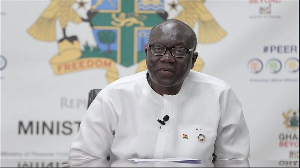A legal practitioner, H. K. Prempeh, says the “market price of party polling agents just went up astronomically” because “Per Justice Atuguba’s opinion, the acts and omissions of Candidate/Party Polling Agents carry far more weight, judicially speaking, than the acts and omissions of Presiding Officers at polling stations.”
“According to the winning logic of Justice Atuguba, acts and omissions of Polling Agents must be irrefutably (and adversely) imputed to the Party or Candidate that appointed them, but acts and omissions of Presiding Officers cannot be adversely imputed to the Electoral Commission, unless those acts or omissions are shown to have been done wilfully.”
This observation was contained in an opinion piece written by the renowned lawyer.
Mr Prempeh says he finds Justice Atuguba’s opinion “very interesting,” considering the fact that, “both in fact and in law, polling agents are not public officers and, moreover, possess no legal authority or mandatory duty in connection with the conduct of elections.”
He insists it is rather the Presiding Officer who, as an officer of the EC, is charged by law—in fact by the Constitution, no less (Article 49)--with the duty, and vested with corresponding authority, to validate the vote at the polling station.
“Indeed, while a party or candidate is not even obliged by law to appoint or have polling agents at a polling station, the EC must, by law, have a Presiding Officer at each polling station. Yet, it is the optional party polling agent, not the mandatory Presiding Officer whose act or omission now carries more legal weight,” Mr Prempeh explains.
He notes that per Justice Atuguba's logic, it would appear that, in terms of mounting a court challenge to the validity of the poll at the polling station, one would be "better off" in court “(but worse off on the ground) if you did not have a polling agent at all, than have a polling agent who would sign the Pink Sheet and prejudice your court case after the fact.”
The legal practitioners adds: “But, of course, I am sure if you chose not to have a polling agent and you appeared before Justice Atuguba to complain about errors or omissions of a Presiding Officer at the polling station, you would be met with the authoritative reply that you should have yourself to blame for not having exercised your right to appoint a polling agent to represent your interests at the polling station.”
According to Mr Prempeh, what Justice Atubuga means by his opinion is that the burden of ensuring the proper conduct of the election at the polling station now rests with rival parties and their polling agents, and not so much with Presiding Officers.
“Per Justice Atuguba's edict, the competence and vigilance of polling agents counts for a great deal more than the competence and vigilance of the EC's Presiding Officers. Justice Atuguba has essentially ‘privatized’ (or ‘partysized’) the conduct and administration of elections at the polling station, by transferring ‘power’ away from Presiding Officers to Party Polling Agents, even though the lawful, indeed constitutional, AUTHORITY and DUTY to validate the votes at the polling station still resides with the Presiding Officer,” he opines.
According to Mr Prempeh, by raising the price of polling agents and simultaneously excusing the errors and commissions of Presiding Officers, Justice Atuguba's judgment will likely produce the following additional effects.
“First, the sharp increase in the price/value of polling agents will inure largely to the advantage to the incumbent party vis-à-vis the opposition party.”
He explains the ultimate result: “We are going to see even more abuse of incumbency, as the incumbent party now has an even greater incentive to divert public resources to hire and reward reliable local party activists and polling agents or to compromise the opposition’s agents.”
The second effect, he explains, is that the rise in the value of polling agents is a huge boost to the power of party foot soldiers and local party executives. “We are going to witness an increasing redistribution of power within political parties in favour of local executives and the most zealous and committed party apparatchiks at the local polling station level,” he observes.
According to Mr Prempeh, future presidential elections are going to become a battle between rival foot soldiers at polling stations across the country, and the nation can expect “political party rivalries to get more local, more muscular, more crude, and potentially more violent at the local level.”
He also anticipates a greater likelihood of loser’s polling agents routinely refusing to sign off on the final vote tally, in order to preserve their objections and their right to challenge the elections in court.
He explains: “Remember that, per Justice Atuguba’s opinion, if your polling agent signed off on the Pink Sheet but the Presiding officer did not, that’s good enough. But since a polling agent is not legally obligated to sign off on the final vote tally, why must he or she bother, if by endorsing the Pink Sheet all he or she would have achieved is to prejudice his or her party’s or candidate’s case in any eventual legal challenge?”
General News of Friday, 6 September 2013
Source: The New Statesman













